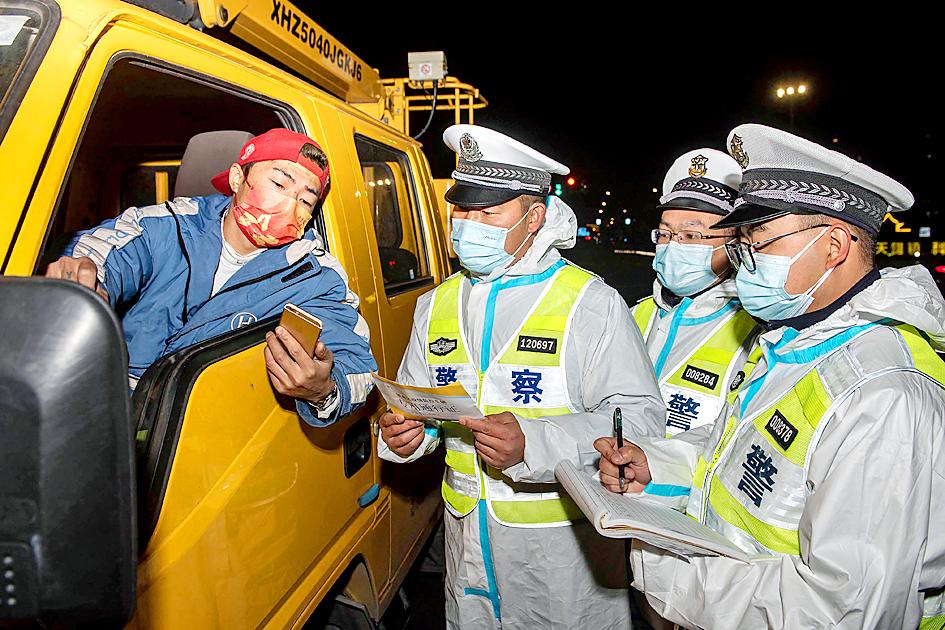Shipping firms are scrambling to switch to other Chinese ports to avoid delays at the Port of Ningbo-Zhoushan, which suspended some trucking services after an outbreak of COVID-19, freight forwarders and experts have said.
Ships are also rerouting to Xiamen in the south, Bloomberg shipping data showed.
Those diversions are adding to a new wave of congestion facing China’s ports as an increasing number of cities deal with COVID-19 outbreaks.

Photo: AFP
Strict testing of workers and truckers ahead of the Lunar New Year holiday at the end of this month is further stressing already strained supply chains as the COVID-19 pandemic heads into its third year.
In the country’s technology hub of Shenzhen in the south, testing of residents and truckers to contain an outbreak meant that a line of ships has formed at the port, which caused the Shekou terminal to start restricting the acceptance of goods, meaning that from today, full containers can only be trucked in three days before vessels are due to arrive, the terminal operator said on Tuesday.
Meanwhile, the northern Chinese city of Tianjin ordered workers to take a half-day break for COVID-19 testing, as officials try to contain an outbreak involving the Omicron variant of SARS-CoV-2.
Trucking capacity is estimated to be half of normal levels, and drivers are required to be tested daily before entering the port, said Alex Hersham, chief executive officer of digital freight forwarder Zencargo.
That outbreak has now spread to the port city of Dalian, with two people who traveled there from Tianjin confirmed to have the Omicron variant.
The influx of ships into Shanghai has delayed sailing schedules for container ships by about one week, freight forwarders said.
Those delays might ripple outward to already backlogged gateways in the US and Europe, they said.
“The port congestion issue will continue to impact restocking cycles this quarter, alongside the Omicron breakout and the impending Chinese [Lunar] New Year closures in China,” said Josh Brazil, vice president of supply chain insights at logistics intelligence firm project44.

In Italy’s storied gold-making hubs, jewelers are reworking their designs to trim gold content as they race to blunt the effect of record prices and appeal to shoppers watching their budgets. Gold prices hit a record high on Thursday, surging near US$5,600 an ounce, more than double a year ago as geopolitical concerns and jitters over trade pushed investors toward the safe-haven asset. The rally is putting undue pressure on small artisans as they face mounting demands from customers, including international brands, to produce cheaper items, from signature pieces to wedding rings, according to interviews with four independent jewelers in Italy’s main

Macronix International Co (旺宏), the world’s biggest NOR flash memory supplier, yesterday said it would spend NT$22 billion (US$699.1 million) on capacity expansion this year to increase its production of mid-to-low-density memory chips as the world’s major memorychip suppliers are phasing out the market. The company said its planned capital expenditures are about 11 times higher than the NT$1.8 billion it spent on new facilities and equipment last year. A majority of this year’s outlay would be allocated to step up capacity of multi-level cell (MLC) NAND flash memory chips, which are used in embedded multimedia cards (eMMC), a managed

Japanese Prime Minister Sanae Takaichi has talked up the benefits of a weaker yen in a campaign speech, adopting a tone at odds with her finance ministry, which has refused to rule out any options to counter excessive foreign exchange volatility. Takaichi later softened her stance, saying she did not have a preference for the yen’s direction. “People say the weak yen is bad right now, but for export industries, it’s a major opportunity,” Takaichi said on Saturday at a rally for Liberal Democratic Party candidate Daishiro Yamagiwa in Kanagawa Prefecture ahead of a snap election on Sunday. “Whether it’s selling food or

In the wake of strong global demand for AI applications, Taiwan’s export-oriented economy accelerated with the composite index of economic indicators flashing the first “red” light in December for one year, indicating the economy is in booming mode, the National Development Council (NDC) said yesterday. Moreover, the index of leading indicators, which gauges the potential state of the economy over the next six months, also moved higher in December amid growing optimism over the outlook, the NDC said. In December, the index of economic indicators rose one point from a month earlier to 38, at the lower end of the “red” light.